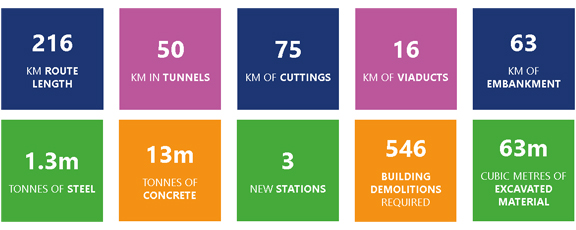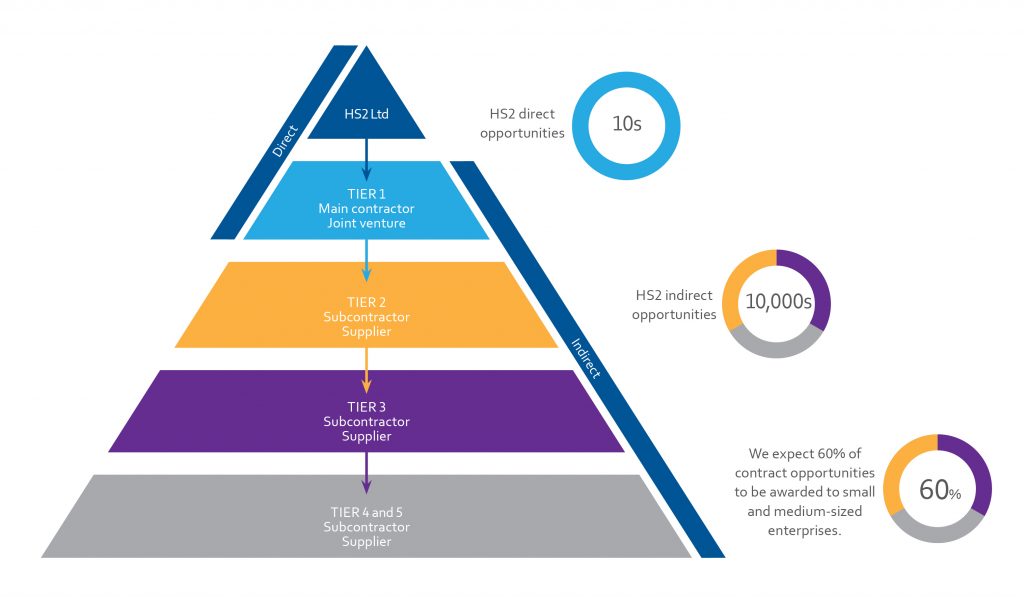
About HS2
HS2, Britain’s new high-speed, zero carbon railway, is now being built. Over 2,400 companies from Dundee to Devon have already delivered work on this national endeavour, with the project currently supporting nearly 30,000 jobs.
Comprising 140-miles of track, four new state-of-the art stations, two depots, 32 miles of tunnel, and 130 bridges, HS2 will leave a legacy of environmentally responsible travel, economic regeneration and technological innovation for generations to come.
The first HS2 services will run between Birmingham Curzon Street and Old Oak Common in London between 2029 and 2033.
Phase One
The first phase of the railway runs between the West Midlands and London with construction well underway. Initially, the first services will run between Birmingham Curzon Street and Old Oak Common in West London, with the line to Euston opening later. We estimate there will be 400,000 contract opportunities from Phase One construction.
The main works contractors and station contractors on Phase One are:
Area North – Balfour Beatty, VINCI (BBV JV)
BBV is responsible for main works in the West Midlands, between Long Itchington Wood Tunnel South Portal to the West Coast Main Line tie-in at Handsacre.
Area Central – Eiffage, Kier, Ferrovial, BAM Nuttall (EKFB JV)
EKFB is responsible for an 80km mostly rural section of the route between the Chiltern Tunnel and Long Itchington Wood.
Area Central – Bouygues, Sir Robert McAlpine, VolkerFitzpatrick (Align JV)
Align is delivering a 22km section of the route between the M25 at Ickenham and Buckinghamshire, covering the Chiltern Tunnel and Colne Valley Viaduct.
Area South – Skanska, Costain, Strabag (SCS JV)
SCS is responsible for the Phase One route in the London area, covering 26km of underground route including Euston tunnels and Northolt tunnels respectively, via the new Old Oak Common station.
Birmingham Curzon Street – Mace Dragados JV
Interchange – Laing O’Rourke
Old Oak Common – Balfour Beatty, VINCI, Systra (BBVS JV)
Euston – Mace Dragados JV
Phase One construction statistics

 Supply Chain Opportunities
Supply Chain Opportunities
For the project as a whole buying a range of major works packages, including enabling from a relatively small number of high-value direct contracts. However, these in turn will give rise to many more indirect supply chain opportunities.
The experience of other large UK infrastructure programmes such as the Olympics and Crossrail suggest we can expect that every 10 direct tier 1 major works contracts to result in over 10,000 indirect supply chain opportunities.
These will be of most interest to SME suppliers, as they will be more appropriate in size and most likely appeal to their specific capabilities.
In total, HS2 expect 60% of contract opportunities to be awarded to SMEs.
Additional Resources
Benchmark and Improve Your Sustainability Knowledge
HS2 is working closely with key supplier partners to deliver a free programme of sustainability training and online support for the wider supply chain. Provided by the Supply Chain Sustainability School this initiative uses a collaborative approach to share learning and build competence linked to HS2 strategic objectives. Topics include Net Zero Carbon, Waste Management, Equality & Diversity, Social Value, Biodiversity and Modern Slavery.
“A really valuable resource to help develop our wider supply chain” Ruth Todd, Chief Commercial Officer, HS2
To find out more please visit https://www.supplychainschool.co.uk/partners/hs2-supply-chain-school/

